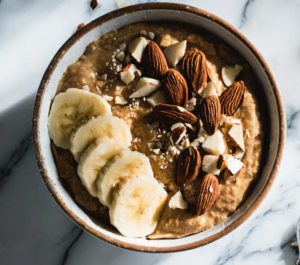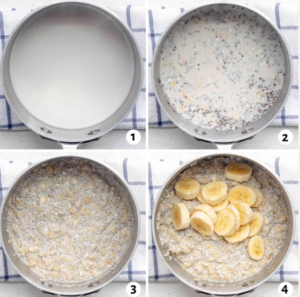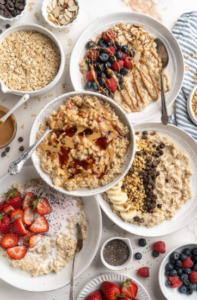Introduction
Oatmeal is a widely loved breakfast choice, but is it truly a protein-rich food? Known for its fiber and heart-health benefits, oatmeal also offers moderate protein content that can be enhanced with the right additions. This article explores oatmeal protein benefits, shares tips to boost its protein profile, and highlights its role in a balanced diet. For more on the nutritional advantages of oatmeal, visit Harvard’s guide to oats.

Why Adding Protein to Oats Is Important
Protein is essential for maintaining muscle mass, promoting satiety, and supporting overall health. A breakfast rich in protein helps reduce mid-morning hunger and supports energy throughout the day. Incorporating protein into oats transforms them into a protein-rich food that can keep you fuller longer and support your dietary goals. For insights into how protein impacts breakfast, check out this Harvard article on healthy breakfasts.
Simple Methods to Increase Protein in Oats

1. Add Protein Powder
Adding protein powder is one of the easiest ways to enhance oatmeal’s protein content. A single scoop can contribute 20–25 grams of protein. Popular options include:
- Whey protein: Smooth texture and neutral flavor.
- Casein protein: Thicker consistency for creamy oats.
- Plant-based proteins: Ideal for vegans, though some have an earthy aftertaste.
Tips for Success:
- Add protein powder after cooking oats to prevent clumping.
- Adjust the liquid ratio to maintain desired consistency.
Learn about weight management with high-protein diets at What Meal Is Best for Weight Loss.
2. Add Nuts, Seeds, and Nut Butters
Enhance your oats with nutrient-dense toppings:
- Chia seeds (2 tablespoons = 5 grams of protein)
- Flaxseeds (1 tablespoon = 2 grams of protein)
- Almond butter (2 tablespoons = 6–7 grams of protein)
For more ideas, dive deeper into the benefits of seeds and grains with Superfoods for Breakfast.
Nutritional Profile of Oatmeal
A typical serving of cooked oatmeal (½ cup) contains:
- Calories: ~150
- Protein: ~5–6 grams
- Fiber: ~4 grams
Although oatmeal isn’t a high-protein food, it offers a balanced amino acid profile, making it a great plant-based option. You can learn more about its nutritional content on the USDA’s FoodData Central.
How to Boost Protein in Oatmeal
1. Add Protein-Rich Toppings
Enhancing oatmeal with nuts, seeds, and yogurt can significantly increase its protein profile, turning it into a truly protein-rich food.
- Nuts and Seeds: Almonds, chia seeds, and flaxseeds provide both protein and healthy fats.
- Greek Yogurt: A creamy, protein-packed addition.
- Nut Butter: Peanut butter or almond butter enhances flavor and protein.
For more creative topping ideas, visit The Kitchn’s high-protein oatmeal recipes.
2. Use Protein Powders
Transform oatmeal into a high-protein breakfast by adding a scoop of whey or plant-based protein powder. Learn more about plant-based protein options at Healthline.
3. Pair Oatmeal with High-Protein Foods
Pair oatmeal with scrambled eggs, turkey sausage, or a protein-rich smoothie to maximize its benefits. Find meal ideas for weight loss at Eat This, Not That.
High-Protein Oats Recipe Ideas
Basic Protein Oats Recipe (30g Protein)
Ingredients:
- ½ cup rolled oats (5g protein)
- 1 scoop whey protein powder (20g protein)
- 1 cup soy milk (8g protein)
- 1 tablespoon chia seeds (2g protein)
Instructions:
- Cook oats with soy milk on medium heat until thickened.
- Stir in protein powder after removing from heat.
- Top with chia seeds and enjoy!
For more inspiration, explore Healthy Breakfast Ideas.
Flavor Variations
- Chocolate Peanut Butter Oats: Add chocolate protein powder and 1 tablespoon peanut butter for a dessert-inspired breakfast.
- Savory Egg White Oats: Stir in egg whites during cooking and top with spinach for a hearty, savory option.
For practical tips on adding protein to oatmeal, read Adding Protein to Oatmeal.
Debunking Myths About Oatmeal

Myth: Oatmeal is a high-protein food.
Fact: While oatmeal offers moderate protein content, it isn’t a high-protein food. Pair it with complementary proteins for a balanced diet. For insights, visit Mayo Clinic’s healthy eating tips.
Myth: Oatmeal can replace meat as a protein source.
Fact: Oatmeal contributes to daily protein intake but cannot replace high-protein foods like meat or legumes. For plant-based protein sources, visit Cleveland Clinic’s recommendations.
FAQs
- How much protein is in oatmeal?
A typical serving of cooked oatmeal contains about 5–6 grams of protein. - Is oatmeal a complete protein?
No, oatmeal lacks some essential amino acids, such as lysine. Pair it with nuts, seeds, or beans for a complete protein profile. - Can oatmeal help with weight loss?
Yes, oatmeal’s fiber content promotes fullness and supports healthy eating. Learn more at WebMD.
Conclusion
Oatmeal may not be a high-protein food, but it is a versatile and nutritious choice. By adding high-protein toppings, using protein powders, and pairing it with complementary foods, you can create a protein-rich meal that supports a balanced diet. For more ideas, explore GoodRx’s protein-boosting oatmeal guide.
